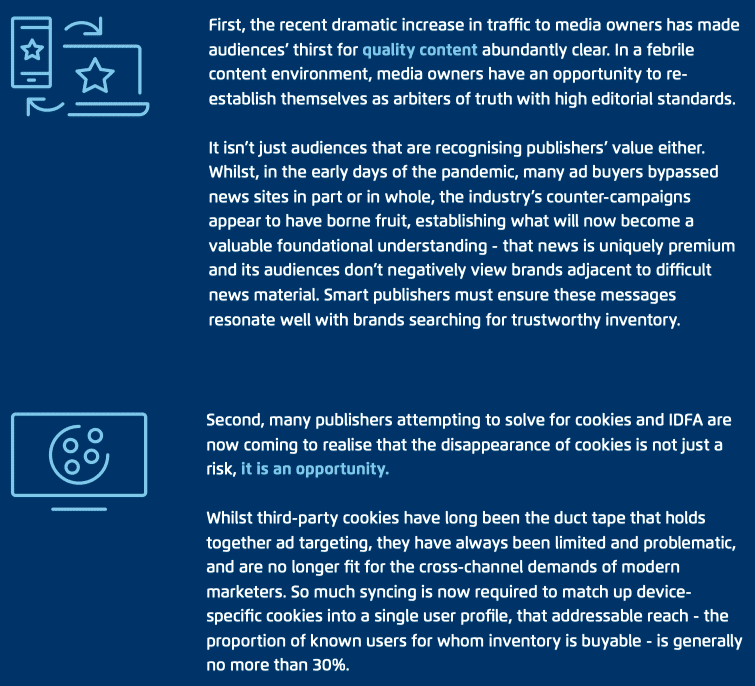|
Getting your Trinity Audio player ready...
|
“When disruption appears all around, when the familiar is crumbling in front of us, it can be hard to see the rays of a brighter future around the corner,” begins LiveRamp’s latest report, Building the Future of Publishing: The Fightback.
“But, just as many businesses and perhaps society are endeavouring to imagine the pandemic as an opportunity for a reset, this moment carries with it the opportunity to finally harness the transformation that has always lain on the other side of these changes.”
LiveRamp, the leading data connectivity platform, commissioned this report to surface challenges being faced by publishers, which include the Covid-19 pandemic, the dominance of the walled gardens, the advancing deprecation of third-party cookies and Apple’s changes to IDFA.
“A brighter tomorrow”
Leading voices in the publishing industry discuss what the current reality is for publishers, explore the strategies that are enabling them to adapt to the changing landscape, and highlight the opportunities for a brighter future.
And what rings out isn’t doubt, despair or defeat, but a resounding resolution to reassert themselves in the face of apparently insurmountable challenges. They agree that the tectonic plates are shifting, but nevertheless, “publishers believe a new day is dawning, lighting up a brighter tomorrow.”

No-one should cry over the cookie’s demise. Rather, it carries with it the opportunity to make the step-change that was already required.
Building the Future of Publishing: The Fightback
“The fightback has already begun”
LiveRamp conducted in-depth interviews with the top brass of leading publishing bodies, including Hearst Magazines, IAB UK, The Guardian, The Telegraph, Dennis Publishing, News UK and others representing large parts of the UK’s major national and regional news publishing segment, specialist magazine publishers and the industry’s representative body.
“They said that, whilst these changes represent significant upheaval, they also present opportunities to finally solve industry power imbalances, to roll out more-capable modern infrastructure and to establish a heightened sense of value amongst both readers and advertisers.
“They declare themselves ready and enthusiastic to counter the looming deprecation of third-party cookies, with clear strategies already in operation for leveraging first-party data to command higher premiums, put audiences back in control and diversify their businesses.
“For these publishers, the fightback has already begun.”
Key findings from the report:
- The crisis will accelerate digital transformation
- Identity foundation will improve upon cookies
- Leaning into identity jump-starts the cookie-less future
- Enhanced effectiveness will drive premium returns
- Paywalls and advertising will blur together
- Creative value will capture audience data
Some selected excerpts:
The crisis will accelerate digital transformation
Coronavirus pressures and game-changing ad-targeting upheaval are acting as a rapid catalyst for reform, as publishers hasten pursuit of digital revenue streams.
Many were already reaching a digital tipping point. The Guardian now makes more revenue from digital than print, while The Times and FT now boast more subscribers online than in print.
COVID-19 is making us do things in six to 12 months that would have taken three years. Our targets and ambitions had to come up. We are well ahead of where we said we would be.
Piers North, Group Digital Director, Reach
Identity foundation will improve upon cookies
Our experts see changes like the deprecation of third-party cookies as profound. “It’s going to change everything,” says News UK’s Walmsley, while IAB UK’s Lakhani expects the impact to be “quite huge”.
But there is also acknowledgement that cookies have out-stayed their welcome. Walmsley calls them “out of date and creaking”. Lakhani agrees: “No-one ever thought the cookie was a holy grail in the first place. They are ineffective because they can’t carry across devices and matching tables are not an efficient way to sync data.”
That trusted relationship between us as a publisher and users coming to our sites, you can’t put a price on that.
Camilla Child, Head of Commercial Data Strategy, The Telegraph
Leaning into identity jump-starts the cookie-less future
The publishers best-placed to capitalise on the new opportunity are those which begin adopting the technology soonest and most enthusiastically.
News UK has been focused on identity solutions for three years, The Telegraph since early 2019. Haymarket Auomotive’s Daniels is taking a “cautious” approach whilst vendors establish their durability. But publishers with strong direct audience relationships have already reduced exposure to upheaval. Dennis and Haymarket Automotive say 90% of their inventory is direct-sold. The Telegraph, similarly, says open marketplace activity is not a key revenue stream.
The datasets are a differentiator. We’re trying to enrich our dataset to make it more valuable, promote the things about our audience that are most valuable to our advertisers.
Frances Hudson, Head of Optimisation, The Guardian
Enhanced effectiveness will drive premium returns
Publishers’ incentive to embrace first-party audience data is clear. Aside from regulatory compulsions and browser makers’ insistence, enhanced capabilities will provide advertisers increased effectiveness.
“All the benefits I originally saw in GDPR never came to fruition – now they can really start to swing,” says Haymarket Automotive’s Daniels. Our expert panel says benefits include more accurate matching, reducing wasted ad exposures, deeper insights, campaign set-up as easy as Facebook and a new focus on creative messaging.
We’ve got a really deep understanding of exactly what they’re reading, what they’re doing, how they’re interacting online. We could share that back with the brands as a bespoke piece of insight for them.
Camilla Child, Head of Commercial Data Strategy, The Telegraph
Paywalls and advertising will blur together
A decade ago, publishers responded to an economy-driven advertising slump by leaning into paid content. Many have disproved initial scepticism – publishers’ focus on subscription has made the model widespread.
In the process, however, their two main business models – payments and advertising – have often developed in isolation. Dogmatically, publishers have felt compelled to choose sides. Going forward, however, user identity is the key which can unlock a less-binary ecology, one in which the two models inter-link to enhance each other.
Once you have a single customer view, once you understand what’s right for them, it doesn’t become a binary choice – paying for content versus having advertising. Successful publishing businesses are able to flex between the two wherever it makes sense. The customer profile capability fuels all those aspects.
Ben Walmsley, Commercial Director, Pushlishing, NewsUK
Creative value will capture audience data
If audience data is the new oil, media owners are currently in a prospecting rush. The key to success is knowing where and how to drill – in other words, how to encourage audience sign-ups.
The answer often depends on publishers’ specific businesses, but a common imperative is engineering sufficient user incentives. “This has to be about the value exchange we can offer users in return for expressed loyalty to our brands,” says Hearst’s Buckley.
Publishers are still feeling out which levers will work best for attracting first-party identifiers. But they agree that a “test-and-learn” approach is the best way.
We need to test and learn along the way. Attracting the right audience is vital for us, so we put a lot of attention into search, to make sure we capture intent to obtain the user.
Ben Walmsley, Commercial Director, Pushlishing, NewsUK
Download the full report from LiveRamp:
Building the Future of Publishing: The Fightback



